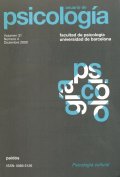Psyche, ethnos y demos: aproximación politica a la psicología cultural
Paraules clau:
Cultural psychology, cross-cultural psychology, reflexivity, cultural policy, ideology, critical cultural psychologyResum
One of the most important achievements of cultural psychology is its capacity to offer a plausible explanation of the links between "mind" and "culture": between the cognitive and emotional architecture adopted by the human mind, and the semiotic anatomy given structure by the world of cultures. But if psiche and ethnos are constitutive factors of culturalpsychology, no less important is the role of demos, the political factor that contextualizes both. However, historical evidence seems grosso modo to suggest the opposite: this dependency is notfilly registered in the main tenets of psycho-cultural projects. This article will analyse the triangular
relationship between psyche, ethnos and demos from a historically self-reflective perspective, taking into account the philosophical and academic conditions which masked the political aspect in the recent history of cultural psychology and, on the other hand, the historical and political conditions
which marked and conditioned its theoretical production. Although our historical reconstruction focuses on the four episodes I consider most relevant - Wundt's Volkerpsychologie, Vygotsky 's Historico-cultural psychology,
post-war Cross-Cultural Psychology and today's Cultural Psychology, the main aim is to establish the heuristic base for a cultural psychology of a critical nature, which is able to confront these times of global neoliberalism. Thus, if a critical cultural psychology is aimed ut studying the psychological behaviours of the population, whose lives develop in
well-dejined political and state contexts, its main objective is to try to incorporate the demos - that is, the political culture of the people - as the principal vector in the psychic confguration of the individual and collective identities.
Descàrregues
Publicades
2000-01-14
Número
Secció
Articles
Llicència
El/la autor/a que publica en esta revista está de acuerdo con los términos siguientes:
El/la autor/a cede en exclusiva todos los derechos de propiedad intelectual al/la editor/a para todo el mundo y toda la duración de los derechos de propiedad intelectual vigentes aplicables.
El/la autor/a puede difundir una copia de sus artículos respetando la política de acceso libre de la revista.


